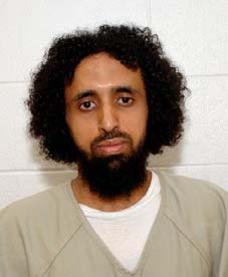As Gitmo Clock Marks 700 Days Since Obama's Promise to Resume Releasing Prisoners, 57th Man Is Approved For Release

The logo for the Gitmo Clock, a website established by the "Close Guantánamo" campaign in 2013, to mark how many days it is since President Obama's promise to resume releasing prisoners, and how many men have been freed.
By Andy Worthington, April 22, 2015
Remember back in May 2013, when a prison-wide hunger strike was raging at Guantánamo? Promoted into action by international criticism, President Obama delivered a major speech on national security issues in which he promised to resume releasing prisoners from Guantánamo, after a period of over two and a half years in which just five men had been freed.
That deadlock had arisen because Congress had imposed onerous restrictions on the release of prisoners, and the president was unwilling to spend political capital overcoming those obstacles, even though he had the power to do so.
After President Obama's promise in May 2013, we at "Close Guantánamo" established the Gitmo Clock to mark how many days it is since the promise, and how many men have been freed.
Today the Gitmo Clock marks 700 days since the promise, and just 44 men have been freed. That is progress, of course, after the inertia of 2010-2013, for which President Obama and his administration must be commended, as many of those men could not safely be returned home -- or, in the case of 12 Yemenis, were from a country whose security situation is not trusted by the U.S. -- and new countries had to be found that would take them in.
For the last three months, however, no one has been freed, even though, of the 122 men remaining in the prison, 57 have been approved for release.
50 of those men were approved for release in by the high-level, inter-agency Guantánamo Review Task Force that President Obama established shortly after taking office in 2009. 43 of these 50 men are Yemenis, and so have run up against the unwillingness of the entire U.S. establishment to contemplate their repatriation, but neither this -- nor the ongoing imprisonment of seven other men approved for release by the task force, including Shaker Aamer, the last British resident in the prison -- can be tolerated indefinitely.
It is, to be blunt, disgraceful to approve men for release -- from a horrendous purgatory of indefinite detention without charge or trial -- and then not set them free. It is, in fact, something that would shame most dictators, who don't pretend that their lawless gulags have meaningful review processes attached.
In addition to these 50 men, seven others have been approved for release in the last 15 months by Periodic Review Boards, established to review the cases of the majority of the other prisoners not already approved for release by the task force. The review process is moving with a glacial slowness that, again, is unacceptable, but in the decisions taken there is, at least, some sort of progress. Although 42 men are still awaiting reviews, 13 have had their cases reviewed to date, and in nine cases the review boards have approved their release -- although only two have been freed. The rest -- six Yemenis and an Egyptian -- have merely joined the seemingly interminable queue of all the other prisoners approved for release but still held.
While we encourage you to contact President Obama and the new defense secretary, Ashton Carter, to demand renewed action on releasing prisoners, we also hope you will visit, like, share and tweet the Gitmo Clock, and we also want to point out that the ninth man to be approved for release after a PRB is Mashur al-Sabri, a Yemeni, whose approval for release was announced last week.
I wrote about al-Sabri's PRB when it took place, on March 3, and posted the opening statement of his civilian lawyer, Brian J. Neff, who has been meeting his client since December 2006, and who encouraged the board to recommend his release.
Below are Mashur al-Sabri's own words, delivered to the PRB on March 3.
Mashur al-Sabri's statement to his Periodic Review Board, March 3, 2015

Mashur al-Sabri, in a photograph from Guantánamo included in the classified military files released by WikiLeaks in 2011.
[In English] Good Morning. I am Mashhoor Al-Sabri. Thank you for hearing my case. I am hoping to start a new life after Guantánamo. My wish is to get married, raise a family and live a peaceful life. I have learned some English but now I would like to speak in Arabic.
[In Arabic, translated] Thank you for your comments for, for listening to me. I was born and raised in Saudi Arabia. I have seven brothers and nine sisters. I am the oldest child. My father, God bless his soul, passed away last year. My mother is still alive but has high blood pressure and other health problems. I don't pose any danger to the United States. I am against violence. I have lost many years of my life in prison and don't have any intention to do any acts that would lead to more loss. I have normal hopes for the future just like any other man. I want to have a job, get married and support my family. I would like to raise children and feel the happiness of having them around me. I want to be with my family and build a future for myself.
As you know, I was imprisoned when I was 24 years old and now I am 37. I want to return to life outside of Guantánamo and put this experience behind me to start a new life. I don't have any political goals and will never get involved in political activities. I am against violence. I don' t have the least intention to spend any more time with other detainees.
I was young before my imprisonment and I was not responsible towards any obligation at that time. But now, I have major obligations. I have many brothers and sisters and I am supposed to be responsible for every one of them since I am the oldest son. I will be responsible to find them wives and husbands. I will also be responsible for dividing the inheritance of my father. Furthermore, I hope to be with my brother to serve her -- with my mother, excuse me -- to serve her and keep away any worries she has about me. I don't want her and the rest of my family to go through pains and worries because of my -- of me anymore.
My first choice would be to return to my home in Saudi Arabia but I am willing to go to any country that will accept me. If I am sent to some other country, I understand and know that integrating into society will require hard work for [sic] me. I have taken classes, here at Guantánamo to prepare for my life after release. This has included classes studying agriculture, business, computers, health, and nutrition. My instructor told me that my score on the final exam in my nutrition course was the highest in the camp. My family will help to support me wherever I am able to find a job. If it was not an Arabic speaking country, I would work hard to learn the language there even before I leave Guantánamo. My hope is that my mother will come to live with me. Of course, I will accept any condition to be imposed on me for my release.
That was all I wanted to say. If the Honorable Board members have any questions, I will do my best to answer them.
* * * * *
You can read the full transcript here, and while I hope Mashur al-Sabri and the other cleared prisoners will be released soon, you can help their cause by contacting the White House and the Pentagon, as detailed below.
Contact the White House and the Pentagon
Call the White House and ask President Obama to release all the men cleared for release, and to make sure that reviews for the other men are fair and objective. Call 202-456-1111 or 202-456-1414 or submit a comment online.
Call the Department of Defense and ask Defense Secretary Ashton Carter to issue certifications for other cleared prisoners, as required by law: 703-571-3343.




